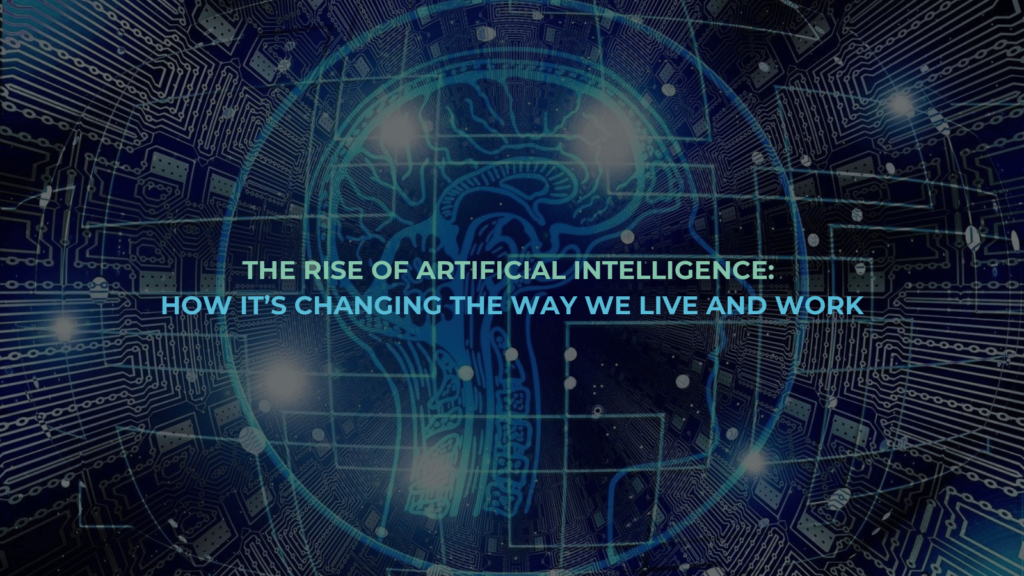Artificial Intelligence (AI) has moved from being a futuristic concept to an integral part of our daily lives. Its influence spans across industries and individual routines, reshaping how we work, communicate, and make decisions. This article explores the profound ways AI is transforming workplaces and personal lifestyles, offering unparalleled convenience, efficiency, and innovation.
AI in the Workplace: Revolutionizing How We Work
1. Enhanced Productivity
AI tools are helping businesses automate repetitive tasks, allowing employees to focus on creative and strategic responsibilities.
- Examples:
- AI-driven chatbots handle customer service inquiries around the clock.
- Tools like Grammarly assist in refining written communication.
- AI-powered project management software streamlines team collaboration.
These tools not only save time but also improve the quality of work.
2. Data-Driven Decision Making
AI excels at analyzing vast amounts of data quickly and accurately, providing valuable insights that inform decisions.
- Applications:
- Predictive analytics for market trends.
- AI in finance to detect fraud and optimize investments.
- Retail businesses use AI to personalize customer experiences and forecast demand.
Organizations leveraging AI for data analysis gain a competitive edge in their respective industries.

3. Workplace Automation
AI is automating tasks across various sectors, increasing efficiency and reducing operational costs.
- Industries Impacted:
- Manufacturing: AI-powered robots streamline production lines.
- Healthcare: AI algorithms assist in diagnostics and treatment planning.
- Logistics: Autonomous vehicles and route optimization tools are transforming supply chains.
While automation boosts productivity, it also necessitates reskilling for employees to adapt to new roles.
4. Remote Work and Virtual Collaboration
AI tools are enhancing remote work experiences by fostering connectivity and collaboration.
- Key Innovations:
- Smart scheduling assistants manage meetings across time zones.
- AI-driven transcription services like Otter.ai convert meetings into actionable insights.
- Virtual reality (VR) environments powered by AI offer immersive team interactions.
These advancements make remote work more efficient and inclusive.
AI in Daily Life: Transforming How We Live
1. Smart Assistants
AI-powered virtual assistants like Siri, Alexa, and Google Assistant are becoming indispensable in managing everyday tasks.
- Capabilities:
- Setting reminders and alarms.
- Providing weather updates and traffic forecasts.
- Controlling smart home devices.
These assistants simplify life by acting as personal schedulers and information hubs.
2. Personalized Recommendations
From Netflix suggestions to Spotify playlists, AI personalizes entertainment by analyzing user preferences.
- Key Sectors Benefiting:
- Retail: Personalized shopping experiences through AI algorithms.
- Healthcare: Tailored fitness and nutrition advice via AI-driven apps.
This level of customization enhances user satisfaction and engagement.
3. Smart Homes
AI is revolutionizing how we interact with our living spaces, offering convenience, energy efficiency, and security.
- Features:
- Smart thermostats learn temperature preferences to optimize comfort.
- AI-powered security cameras detect unusual activity.
- Voice-activated lighting and appliances simplify household tasks.
Smart homes exemplify how AI enhances daily living by blending technology with comfort.
4. Transportation
AI is driving innovation in how we travel, making transportation safer and more efficient.
- Examples:
- Autonomous vehicles equipped with AI offer hands-free driving.
- AI-powered traffic management systems reduce congestion.
- Ride-sharing apps use AI to match passengers and drivers optimally.
These technologies are not just futuristic—they are actively shaping our journeys.
Challenges and Ethical Considerations
Despite its benefits, the widespread adoption of AI presents challenges:
- Job Displacement:
Automation threatens traditional roles, requiring workforce reskilling and adaptation. - Data Privacy:
AI systems rely on massive amounts of data, raising concerns about security and misuse. - Bias in Algorithms:
If not trained properly, AI systems may reinforce biases, leading to unfair outcomes.
Addressing these issues requires collaboration between technologists, policymakers, and society.
The Future of AI: What Lies Ahead
AI’s impact is only beginning. Future developments could include:
- Hyper-Personalization: AI will continue to refine its ability to understand and predict individual needs.
- AI in Education: Customized learning experiences tailored to each student’s pace and style.
- Healthcare Revolution: Advanced AI systems capable of real-time diagnostics and preventive care.
The possibilities are endless, and the journey has just begun.
Conclusion
AI is more than a technological advancement; it’s a transformative force reshaping how we work and live. By automating tasks, personalizing experiences, and enabling smarter decisions, AI is enhancing productivity and convenience. However, as we embrace this new era, we must also navigate its challenges responsibly. The future promises an AI-driven world that is both exciting and dynamic, with endless opportunities to improve our lives.











